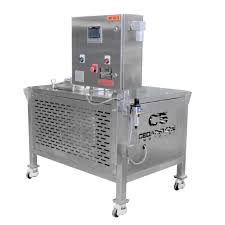
The Definitive Guide for Hemp Extractors Tools
Our processes and technologies for processing cannabinoids have become more complex. Hemp extractors companies now borrow equipment and GMPs from the pharmaceutical and food processing sectors. As a result, hemp companies create pure extracts that give precise and consistent CBD doses. When it comes to hemp extractors equipment, hemp farmers and manufacturers have several alternatives. In general, your decisions on purchasing hemp extractors equipment will be influenced by your business objectives and budgetary limits.

Let's take a closer look at hemp extractors equipment to have a better understanding of the technology that goes into producing high-quality CBD products.
CBD Extraction Machines
Hemp extractors equipment is essential for bringing CBD products to market. Extraction method, in essence, isolates CBD and terpenes from surplus plant elements using solvents. Solvents are liquid compounds that can dissolve or disperse one or more other substances. CBD extraction machinery often employs one or more of the following solvents: carbon dioxide, ethanol, and hydrocarbons.
Supply chain for CBD products
CBD oil extraction equipment is now an important part of the CBD product supply chain. Many of the CBD products on the market today would not be possible without technologies such as supercritical extractors. CBD extraction machines take raw plant material and extract important terpenes and cannabinoids. These extracts are then infused in CBD products like gummies, salves, and drinks after being removed from superfluous plant material. Vertically integrated producers or manufacturers who purchase raw hemp biomass typically own and run hemp extractors technologies. In any event, this technology bridges a key gap between hemp producers and CBD consumers.
Considerations When Choosing Hemp Extractors Equipment
When it comes to choosing a hemp extractors equipment, there are various variables to consider. You must not only examine your budget, but you must also consider your target audience. Finally, different extraction procedures will result in various hemp CBD products.
Extraction equipment capable of withstanding the rigors of commercial CBD product manufacture is not inexpensive. While several extraction processes are available for both small and large producers, commercial equipment is required to treat large crops. Commercial-grade hydrocarbon extractors can cost up to $200,000, whereas supercritical extractors of comparable scale can cost up to $500,000. Understanding what your final CBD product will be might also help you choose the correct extraction equipment. For example, if product purity is important to your business, extraction is probably a better alternative than hydrocarbon extraction. Specifically, you might indicate that you do not utilize any hazardous solvents in the production of your CBD products.
Hydrocarbon CBD Extraction Equipment
Hydrocarbon hemp extractors equipment isolates CBD from other hemp plant components by using hydrocarbon solvents such as butane and propane. Because butane and propane are both very volatile, hydrocarbon extractors are designed with strict safety precautions in mind. In the current hemp industry, closed-loop extraction technology is the industry standard for hydrocarbon extracts. This hydrocarbon hemp extractors apparatus is referred to as "closed-loop" since the solvents are never exposed to the open air. As a result, dealing with highly volatile hydrocarbons is significantly reduced. Manufacturers of hydrocarbon extractors have developed exceedingly complex methods for purging these extracts of all remaining solvents. Many popular cannabis extracts, like wax, shatter, and crumble, are produced using hydrocarbon extraction.
Ethanol Hemp Extractors Equipment
Alcohol is used as a solvent by ethanol hemp extractors equipment to extract CBD and other beneficial cannabinoids and terpenes. Even while residual solvents may be safely removed from hydrocarbon extracts, some people are nevertheless hesitant to consume them. Therefore, for certain customer demographics, ethanol presents a "cleaner" alternative to hydrocarbon extracts. Ethanol extractors, like other extraction techniques, submerge hemp plant materials in extremely low temperatures before soaking them in the solvent. The surplus ethanol is subsequently removed from the extract using filtering. On rare occasions, producers would go one step farther and separate a particular cannabinoid from the extract, such as CBD or THC. Because it is easily scalable and can be used to create a wide range of products, ethanol extraction is popular among CBD producers. The fact that ethanol extraction operates at various temperatures allows extraction teams more control over the materials they can extract. Warmer ethanol extractions draw a wider spectrum of terpenes as well as other water-soluble compounds, whereas colder extractions are better at separating more particular cannabinoids and terpenes.
CO2 CBD Extraction Equipment
Manufacturers have been able to borrow ideas from other sectors to create innovative extraction techniques. To this goal, food producers have largely adapted carbon dioxide extraction techniques. For instance, taste extraction from organic molecules and subsequent infusion into other goods using is a common technique. The cleanest extraction method is CO2, despite the fact that ethanol extraction is frequently thought to be more eco-friendly than hydrocarbon extraction. extraction has become popular among CBD manufacturers since it avoids the use of volatile substances that might be harmful to the environment or human health. According to extraction specialists, it has been used widely since it is abundant, inexpensive, non-toxic, non-flammable, relatively chemically inert, and forms at almost room temperature. Even though extraction is very common in the hemp business, some producers have shunned it because of its high overhead costs.